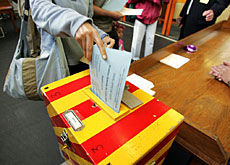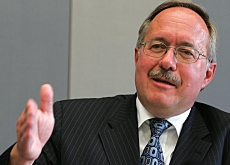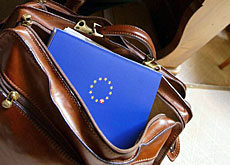Vote on EU accords bridged cultural divide

The gap between town and country had a greater influence than language on the way the Swiss voted on the Schengen/Dublin accords, a survey has revealed.
In a nationwide vote on June 5 the Swiss made clear their preference for an open Switzerland closely integrated with Europe. Voting patterns largely reflected party-political support.
The referendum called for closer cooperation with the European Union on security and asylum issues.
The analysis, conducted by the Bern-based GfS polling institute, revealed declining support among French-speaking Swiss for closer political ties with Europe.
At the same time it pointed to a rapprochement between German-speaking and French-speaking Switzerland.
The “Röstigraben” – the name given to the linguistic and cultural divide between French- and German-speakers – appears to be less deep than the political divide.
According to the survey published on Tuesday, 53 per cent of voters in rural areas of French-speaking Switzerland said yes to Schengen/Dublin – whereas in 1992 71 per cent had supported the European Economic Area Treaty (which was narrowly rejected).
On the other hand approval of closer ties with Europe in Swiss-German cities has increased: 72 per cent said yes to Schengen but only 53 per cent voted yes in 1992.
Fear of increased immigration was the greatest concern of opponents of Schengen/Dublin, the survey’s authors said.
Political influence
Voting behaviour was split much by political attitudes, with voters closely following the line laid down by the party they supported.
Ninety-two per cent of voters who supported the rightwing Swiss People’s Party voted against Schengen.
However the treaty was backed by 82 per cent of people who supported the centre-left Social Democratic Party, 79 per cent of supporters of the centre-right Radical Party and 72 per cent of supporters of the centre-right Christian Democratic Party.
According to GfS, the difference in opinion between People’s Party supporters and the other governing parties has trebled since the 1992 vote.
Partnership law
Party-political influence was also apparent in the referendum’s proposal to provide a legal framework for same-sex partnerships.
Supporters of the People’s Party – in addition to older, more traditionally minded and religious people – generally rejected the proposal, whereas supporters of the other parties and younger, more forward-looking voters backed it.
Religious denomination did not play a discernible role.
In general greater importance was attached to the Schengen/Dublin treaty than to the proposal for same-sex partnerships.
swissinfo with agencies
The Swiss electorate approved membership of the EU’s Schengen/Dublin accords with 54.6% in favour.
A new law on registering same-sex partnerships was approved by 58.03%.
Turnout in the vote on June 5, 2005 was higher than average at 55.9%.
The rules of the Schengen/Dublin Treaty will come into force at the start of 2008.
Switzerland will then also be able to use the Schengen Information System II (SIS II).
The Schengen visa does not entitle anyone to work or settle in Switzerland.

In compliance with the JTI standards
More: SWI swissinfo.ch certified by the Journalism Trust Initiative



You can find an overview of ongoing debates with our journalists here. Please join us!
If you want to start a conversation about a topic raised in this article or want to report factual errors, email us at english@swissinfo.ch.